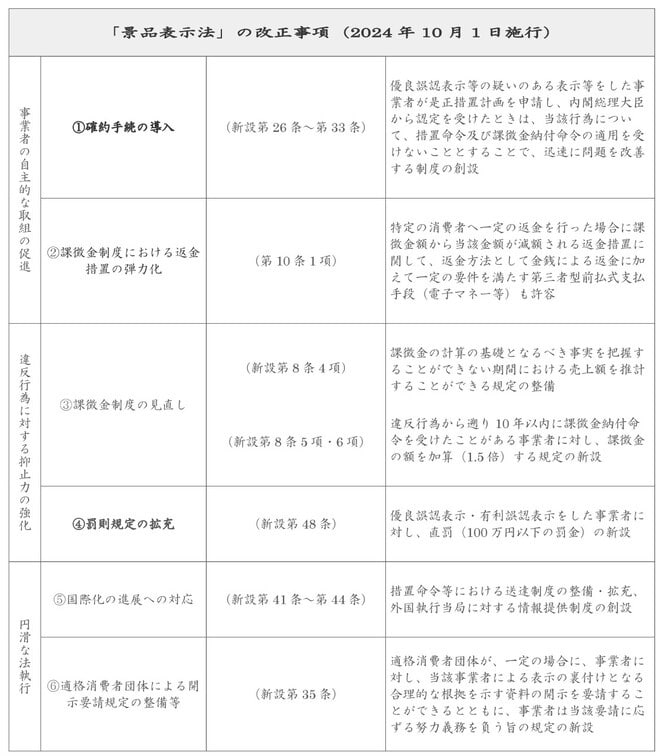Enforcement in October of Reiwa 6 (2024): What are the Guaranteed Procedures and Direct Penalty Provisions? Explaining the Key Points of the Premiums and Representations Act Amendments

In recent years, the prevalence of false and exaggerated advertising, as well as stealth marketing on the internet, has become a significant issue, with such deceptive practices misleading consumers.
The amendment to the Japanese Act against Unjustifiable Premiums and Misleading Representations, which will come into effect in October of Reiwa 6 (2024), introduces “affirmation procedures” and an “expansion of direct penalty provisions” to address these problems, establishing stricter regulations. The revised law is expected to curb malicious activities in internet advertising and enhance consumer protection.
This article provides a detailed explanation of the “affirmation procedures” and the “expansion of direct penalty provisions” that will be implemented in October of Reiwa 6.
Overview and Background of the Amendments to the Japanese Premiums and Representations Act
The amendments to the Japanese Premiums and Representations Act, which took effect in May of Reiwa 5 (2023), aim to encourage voluntary compliance by businesses and strengthen the deterrent against violations. The amendments primarily include the following six changes:
- Introduction of a confirmation procedure
- Flexibilization of refund measures in the administrative monetary penalty system
- Revision of the administrative monetary penalty system
- Expansion of penal provisions
- Adaptation to the progress of internationalization
- Introduction of disclosure request provisions by qualified consumer organizations

Among these, we will explain the key points of the newly established confirmation procedure and direct penalty provisions, which have a significant impact on business practices.
Key Points of the Japanese Premiums and Representations Act (Jōhin Hyōji Hō) Amendment #1: Introduction of the Assurance Procedure
The assurance procedure is a system designed to encourage swift resolution of issues by introducing a voluntary assurance process for businesses suspected of violating the Japanese Premiums and Representations Act. This process aims to prevent the imposition of current administrative sanctions, such as “orders for measures and payment orders for surcharges,” thereby facilitating prompt improvement.
Previously, if there was suspicion of a violation and the investigation confirmed the violation, there were measures such as orders for measures (Article 7, Paragraph 1 of the Jōhin Hyōji Hō) and payment orders for surcharges (Article 8, Paragraph 1 of the Jōhin Hyōji Hō). However, considering that encouraging voluntary initiatives by businesses could lead to more significant improvements rather than imposing penalties, this assurance procedure was established.
What is an Application for Approval of a Commitment Plan?
There are two types of commitment procedures: applications for approval of a “Corrective Action Plan” and applications for approval of an “Impact Correction Action Plan.” Businesses that are required by the Consumer Affairs Agency to take corrective measures can voluntarily create a “Corrective Action Plan” and apply for its approval, thereby avoiding orders for measures or payment orders for administrative fines.
This process is designed for businesses and administrative agencies to cooperate in resolving issues, and the specific content of the plan varies depending on the nature, scale, and impact of the violation.
The commitment procedure is initiated by the Consumer Affairs Agency issuing a notice of commitment procedure to the business (suspected violator) only when it deems it necessary to ensure voluntary and rational choice of goods and services by general consumers in relation to the business’s suspected violation of the Japanese Premiums and Representations Act, before granting an opportunity to argue against orders for measures or payment orders for administrative fines.
In other words, the Consumer Affairs Agency selects which cases should be subject to the commitment procedure, and it is considered that cases subject to direct penalties, repetitive violations, or cases with significant damage are not subject to the commitment procedure.
The content of the “Notice of Commitment Procedure” includes the following statutory items (Article 26 or Article 30 of the Japanese Premiums and Representations Act):
- Summary of the suspected violation
- Provisions of laws and regulations suspected of being violated
- That an application for approval of a “Corrective Action Plan” or “Impact Correction Action Plan” (collectively referred to as “Commitment Plan”) can be made to correct the effects of the suspected violation and its impact
Businesses that receive a notice of commitment procedure can create a necessary action plan (Commitment Plan) to correct the impact of the suspected violation and apply for its approval.
The effect of receiving approval from the Commissioner of the Consumer Affairs Agency is that, unless the approval is revoked, the provisions related to legal measures will not be applied to the suspected violation, meaning that no orders for measures or payment orders for administrative fines will be imposed.
The flow of the commitment procedure is as follows:

Criteria for Approval of Commitment Plans
To be approved, a commitment plan must meet the following two criteria:
- Sufficiency of the measures
- Certainty of implementation
“Sufficiency of the measures” refers to the Consumer Affairs Agency’s practice of referencing the content of legal measures in past cases with similar violations and applicable legal provisions to determine whether the specific case meets the requirements.
“Certainty of implementation” means that even if the sufficiency of the measures is met, the plan will not be approved unless it can be implemented reliably within the set deadline. To ensure certainty of implementation, it is necessary to establish a compliance system and ensure thorough awareness among officers and employees.
When performing remedial actions as part of the commitment measures, if the method of notification to the general consumers, the amount of necessary funds, and the method of procurement are not clearly specified, the certainty of implementation is not considered to be met.
Furthermore, when applying, it is required to set a deadline for the implementation of the commitment measures and to submit the relevant documents.
While having a voluntary refund to consumers in the content of the commitment plan makes it easier to receive approval, the Consumer Affairs Agency does not consider refunds mandatory and negotiations are expected to be conducted on a case-by-case basis.
After approval, it is possible to change the commitment plan depending on the situation, but a re-approval review will be required.
Reference: Cabinet Office Ordinance on Procedures for Commitments based on the provisions of the Act against Unjustifiable Premiums and Misleading Representations | “Application Format for Approval of Commitment Plans[ja]“
Publication and Reporting of Commitment Plans
Similar to the Japanese Antimonopoly Act, if a commitment plan is approved, it is scheduled to be published.
The Consumer Affairs Agency plans to publish an overview of the approved commitment plan, a summary of the suspected violation, the name of the business, and other necessary information, in order to ensure transparency in the application of the law related to commitment procedures and predictability for businesses.
Of course, this publication does not constitute a recognition of a violation of the Japanese Act against Unjustifiable Premiums and Misleading Representations.
Furthermore, businesses are required to report to the Consumer Affairs Agency on the status of their compliance with the commitment measures. The timing and frequency of these reports are also expected to be stipulated in the commitment plan.
Key Points of the Premiums and Representations Act Revision #2: Direct Penalty Provisions

In this section, we will explain the newly established direct penalty provisions included in the recent revision.
Direct penalty provisions allow for the immediate application of penalties without going through processes such as administrative guidance or orders to encourage voluntary improvement in cases of malicious violations. Under these provisions, a fine of up to 1 million yen can be imposed without the need for measures such as issuance of orders or hearings. The targeted violations are “misleading representations of superiority” and “misleading representations of advantage.”
The scope of applicable entities includes businesses involved in violations, whether directly or indirectly, and intentionally, and it is believed that cases that do not violate the Japanese Unfair Competition Prevention Act, the Japanese Food Labeling Act, or the Japanese Pharmaceuticals and Medical Devices Act are considered.
The introduction of direct penalty provisions is expected to strengthen the deterrent effect against violations of the Premiums and Representations Act, further enhancing consumer protection.
Summary: Consult with a Lawyer for Compliance with the Revised Japanese Premiums and Representations Act
We have explained the key points of the revised Japanese Premiums and Representations Act, which will come into effect on October 1, 2024 (Reiwa 6).
As mentioned above, the “assurance procedures” are voluntary initiatives by businesses. Therefore, to meet the certification standards and avoid administrative or criminal penalties, it is necessary to plan and implement corrective measures in collaboration with experts.
If you have any questions about the rule changes associated with the revision of the Japanese Premiums and Representations Act, we recommend consulting with a highly specialized lawyer.
Guidance on Measures by Our Firm
Monolith Law Office is a law firm with extensive experience in both IT, particularly the internet, and legal matters. In recent years, violations of the Japanese Act against Unjustifiable Premiums and Misleading Representations, such as deceptive advertising on the internet, have become a significant issue, and the need for legal checks is ever-increasing. Our firm offers services such as legal checks for advertisements and landing pages (LPs), and the creation of guidelines, all while considering various legal regulations. Please refer to the article below for more details.
Areas of practice at Monolith Law Office: Legal Checks for Articles and LPs under the Japanese Pharmaceuticals and Medical Devices Act, etc.[ja]
Category: General Corporate





















